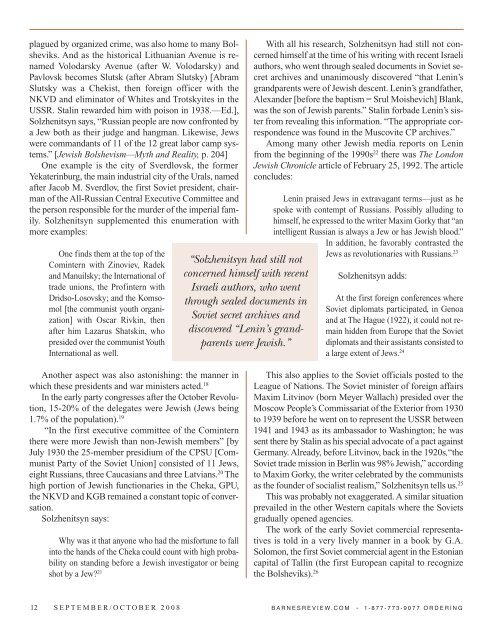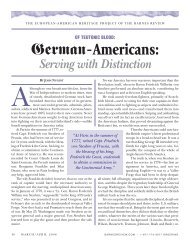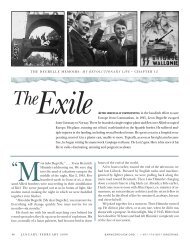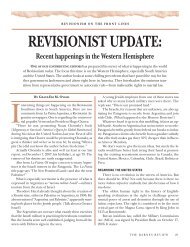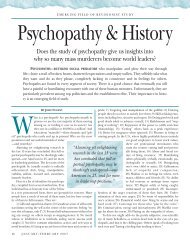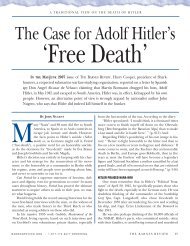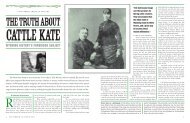Russia and the Jews
Russia and the Jews
Russia and the Jews
You also want an ePaper? Increase the reach of your titles
YUMPU automatically turns print PDFs into web optimized ePapers that Google loves.
plagued by organized crime, was also home to many Bolsheviks.<br />
And as <strong>the</strong> historical Lithuanian Avenue is renamed<br />
Volodarsky Avenue (after W. Volodarsky) <strong>and</strong><br />
Pavlovsk becomes Slutsk (after Abram Slutsky) [Abram<br />
Slutsky was a Chekist, <strong>the</strong>n foreign officer with <strong>the</strong><br />
NKVD <strong>and</strong> eliminator of Whites <strong>and</strong> Trotskyites in <strong>the</strong><br />
USSR. Stalin rewarded him with poison in 1938.—Ed.],<br />
Solzhenitsyn says, “<strong>Russia</strong>n people are now confronted by<br />
a Jew both as <strong>the</strong>ir judge <strong>and</strong> hangman. Likewise, <strong>Jews</strong><br />
were comm<strong>and</strong>ants of 11 of <strong>the</strong> 12 great labor camp systems.”<br />
[Jewish Bolshevism—Myth <strong>and</strong> Reality, p. 204]<br />
One example is <strong>the</strong> city of Sverdlovsk, <strong>the</strong> former<br />
Yekaterinburg, <strong>the</strong> main industrial city of <strong>the</strong> Urals, named<br />
after Jacob M. Sverdlov, <strong>the</strong> first Soviet president, chairman<br />
of <strong>the</strong> All-<strong>Russia</strong>n Central Executive Committee <strong>and</strong><br />
<strong>the</strong> person responsible for <strong>the</strong> murder of <strong>the</strong> imperial family.<br />
Solzhenitsyn supplemented this enumeration with<br />
more examples:<br />
One finds <strong>the</strong>m at <strong>the</strong> top of <strong>the</strong><br />
Comintern with Zinoviev, Radek<br />
<strong>and</strong> Manuilsky; <strong>the</strong> International of<br />
trade unions, <strong>the</strong> Profintern with<br />
Dridso-Losovsky; <strong>and</strong> <strong>the</strong> Komsomol<br />
[<strong>the</strong> communist youth organization]<br />
with Oscar Rivkin, <strong>the</strong>n<br />
after him Lazarus Shatskin, who<br />
presided over <strong>the</strong> communistYouth<br />
International as well.<br />
“Solzhenitsyn had still not<br />
concerned himself with recent<br />
Israeli authors, who went<br />
through sealed documents in<br />
Soviet secret archives <strong>and</strong><br />
discovered “Lenin’s gr<strong>and</strong>parents<br />
were Jewish.”<br />
With all his research, Solzhenitsyn had still not concerned<br />
himself at <strong>the</strong> time of his writing with recent Israeli<br />
authors, who went through sealed documents in Soviet secret<br />
archives <strong>and</strong> unanimously discovered “that Lenin’s<br />
gr<strong>and</strong>parents were of Jewish descent. Lenin’s gr<strong>and</strong>fa<strong>the</strong>r,<br />
Alex<strong>and</strong>er [before <strong>the</strong> baptism = Srul Moishevich] Blank,<br />
was <strong>the</strong> son of Jewish parents.” Stalin forbade Lenin’s sister<br />
from revealing this information. “The appropriate correspondence<br />
was found in <strong>the</strong> Muscovite CP archives.”<br />
Among many o<strong>the</strong>r Jewish media reports on Lenin<br />
from <strong>the</strong> beginning of <strong>the</strong> 1990s 22 <strong>the</strong>re was The London<br />
Jewish Chronicle article of February 25, 1992. The article<br />
concludes:<br />
Lenin praised <strong>Jews</strong> in extravagant terms—just as he<br />
spoke with contempt of <strong>Russia</strong>ns. Possibly alluding to<br />
himself, he expressed to <strong>the</strong> writer Maxim Gorky that “an<br />
intelligent <strong>Russia</strong>n is always a Jew or has Jewish blood.”<br />
In addition, he favorably contrasted <strong>the</strong><br />
<strong>Jews</strong> as revolutionaries with <strong>Russia</strong>ns. 23<br />
Solzhenitsyn adds:<br />
At <strong>the</strong> first foreign conferences where<br />
Soviet diplomats participated, in Genoa<br />
<strong>and</strong> at The Hague (1922), it could not remain<br />
hidden from Europe that <strong>the</strong> Soviet<br />
diplomats <strong>and</strong> <strong>the</strong>ir assistants consisted to<br />
a large extent of <strong>Jews</strong>. 24<br />
Ano<strong>the</strong>r aspect was also astonishing: <strong>the</strong> manner in<br />
which <strong>the</strong>se presidents <strong>and</strong> war ministers acted. 18<br />
In <strong>the</strong> early party congresses after <strong>the</strong> October Revolution,<br />
15-20% of <strong>the</strong> delegates were Jewish (<strong>Jews</strong> being<br />
1.7% of <strong>the</strong> population). 19<br />
“In <strong>the</strong> first executive committee of <strong>the</strong> Comintern<br />
<strong>the</strong>re were more Jewish than non-Jewish members” [by<br />
July 1930 <strong>the</strong> 25-member presidium of <strong>the</strong> CPSU [Communist<br />
Party of <strong>the</strong> Soviet Union] consisted of 11 <strong>Jews</strong>,<br />
eight <strong>Russia</strong>ns, three Caucasians <strong>and</strong> three Latvians. 20 The<br />
high portion of Jewish functionaries in <strong>the</strong> Cheka, GPU,<br />
<strong>the</strong> NKVD <strong>and</strong> KGB remained a constant topic of conversation.<br />
Solzhenitsyn says:<br />
Why was it that anyone who had <strong>the</strong> misfortune to fall<br />
into <strong>the</strong> h<strong>and</strong>s of <strong>the</strong> Cheka could count with high probability<br />
on st<strong>and</strong>ing before a Jewish investigator or being<br />
shot by a Jew 21<br />
This also applies to <strong>the</strong> Soviet officials posted to <strong>the</strong><br />
League of Nations. The Soviet minister of foreign affairs<br />
Maxim Litvinov (born Meyer Wallach) presided over <strong>the</strong><br />
Moscow People’s Commissariat of <strong>the</strong> Exterior from 1930<br />
to 1939 before he went on to represent <strong>the</strong> USSR between<br />
1941 <strong>and</strong> 1943 as its ambassador to Washington; he was<br />
sent <strong>the</strong>re by Stalin as his special advocate of a pact against<br />
Germany. Already, before Litvinov, back in <strong>the</strong> 1920s,“<strong>the</strong><br />
Soviet trade mission in Berlin was 98% Jewish,” according<br />
to Maxim Gorky, <strong>the</strong> writer celebrated by <strong>the</strong> communists<br />
as <strong>the</strong> founder of socialist realism,” Solzhenitsyn tells us. 25<br />
This was probably not exaggerated. A similar situation<br />
prevailed in <strong>the</strong> o<strong>the</strong>r Western capitals where <strong>the</strong> Soviets<br />
gradually opened agencies.<br />
The work of <strong>the</strong> early Soviet commercial representatives<br />
is told in a very lively manner in a book by G.A.<br />
Solomon, <strong>the</strong> first Soviet commercial agent in <strong>the</strong> Estonian<br />
capital of Tallin (<strong>the</strong> first European capital to recognize<br />
<strong>the</strong> Bolsheviks). 26<br />
12 S E P T E M B E R / O C T O B E R 2 0 0 8 B A R N E S R E V I E W . C O M • 1 - 8 7 7 - 7 7 3 - 9 0 7 7 O R D E R I N G


